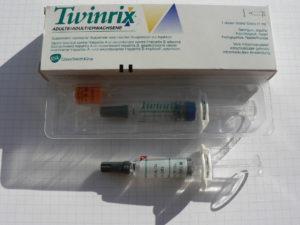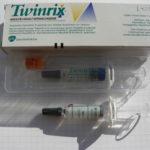
Twinrix GlaxoSmithKline combined vaccines hepatitis A (inactivated) + hepatitis B (recombinant S antigen) with Terumo needle and syringes (Wikimedia Commons)
Hepatitis A (HAB) and/or Hepatitis B (HBV) virus infection is common in Chronic Hepatitis C virus (HCV) and/or HIV infected individuals. Co-infection with HAV or HBV in these patient populations is associated with increased pathogenesis and disease progression, as a result vaccination against HAB and HBV is standard of care in some countries.
Chronic HCV and HIV infections is associated with impaired vaccine induced immunity in response to many vaccinations including those against HAV and HBV infection. Impaired immune responses in HCV infected individuals is not related to pathogenesis of HCV, and occurs post-antiretroviral therapy (ART) in HIV infected individuals. This suggests a potential role of immune dysfunction in the impairment of vaccine induced immunity and not pathogenesis of HCV or HIV infection in these individuals.
Plasma levels of inflammatory mediators IL-6 and soluble CD14 (sCD14) have been associated increased morbidity and mortality in HCV and HIV infected individuals. However, associations between these inflammatory mediators and vaccine responses had not been investigated prior to the study conducted by Shive et al.
Systemic inflammation, particularly plasma levels of sCD14, sCD163, IL-6 (cytokine) and IP-10 (CXCL10, chemokine receptor) are elevated in untreated-HCV and HIV infected individuals. Shive et al. compared pre-vaccination levels of theses inflammatory mediators with recent neo-antigen HAV/HBV and recall antigen tetanus booster vaccine induced antibody (Ab) response in untreated HCV and HIV individuals.
Shive et al. observed a negative association between pre-vaccination plasma levels of sCD14, sCD163, IL-6 and IP-10 and vaccine induced immunity to HAV/HBV and tetanus in untreated-HCV and HIV infected individuals. They suggested that impairment of vaccine responses may be due to impairment of “helper” T cell responses and survival by IL-6. Thus soluble marker of systemic inflammation can be utilised as negative predictors of subsequent vaccine responses, which can guide future vaccination strategies in individuals affected by HIV and HCV infection. Additionally, this highlights the need for novel HAB and HBV vaccine strategies that able to induce protective immunity in the presence of systemic inflammation.
Journal Article: Shive et al. 2018. Pre-vaccine plasma levels of soluble inflammatory indices negatively predict responses to HAV, HBV, and tetanus vaccines in HCV and HIV infection. Vaccine.
Article by Cheleka AM Mpande.
